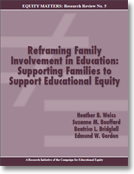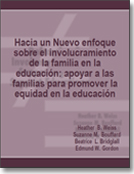The Harvard Family Research Project separated from the Harvard Graduate School of Education to become the Global Family Research Project as of January 1, 2017. It is no longer affiliated with Harvard University.
|
December 2009 Reframing Family Involvement in Education: Supporting Families to Support Educational EquityHeather B. Weiss, Suzanne M. Bouffard, Beatrice L. Bridglall, Edmund W. Gordon
|
 |
 |
| Download PDF (In English) |
Download PDF (En Español) |
This research review, part of the Equity Matters research initiative at the Campaign for Educational Equity at Teachers College, Columbia University, argues that family involvement in education is a powerful but neglected tool to support children’s learning and development. Beginning with a brief historical overview of conceptions of family roles and responsibilities in children’s learning, this paper next offers a review of recent research on the ways in which expectations and support for family involvement have shifted, particularly with respect to economically disadvantaged and racial and ethnic minority families. Research suggests that low-income families have fewer opportunities for involvement in their children's education and are less involved in many ways.
To reframe public understanding of the benefits of family involvement in children’s education, this paper lays out a research-based definition and more equitable approach to family involvement and positions it as a key cross-cutting component of broader comprehensive or complementary learning systems in which families, schools, after school and summer learning programs, school-based health clinics, and others have a shared responsibility for children’s learning.
The paper calls for a greater understanding of how family involvement influences learning, as well as the ways that contextual factors influence involvement among disadvantaged families. The authors stress the need for a more research-based and collaborative approach to family involvement to replace current marginalized and piecemeal policy efforts so that family involvement becomes seen as a major part of the effort to achieve educational equity.
Reframing Family Involvement in Education: Supporting Families to Support Educational Equity is the fifth research review in the Equity Matters series published by the Campaign for Educational Equity at Teachers College, Columbia University
Free. Available online only.
